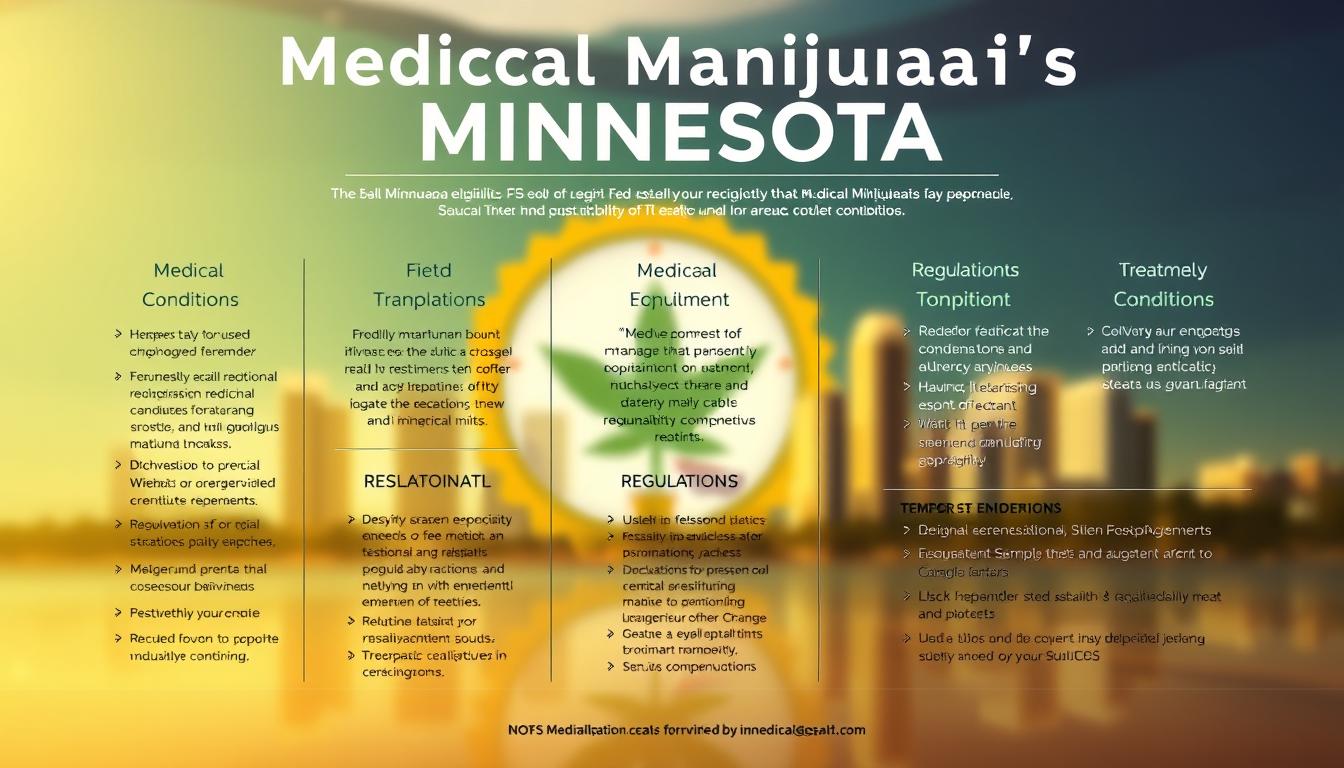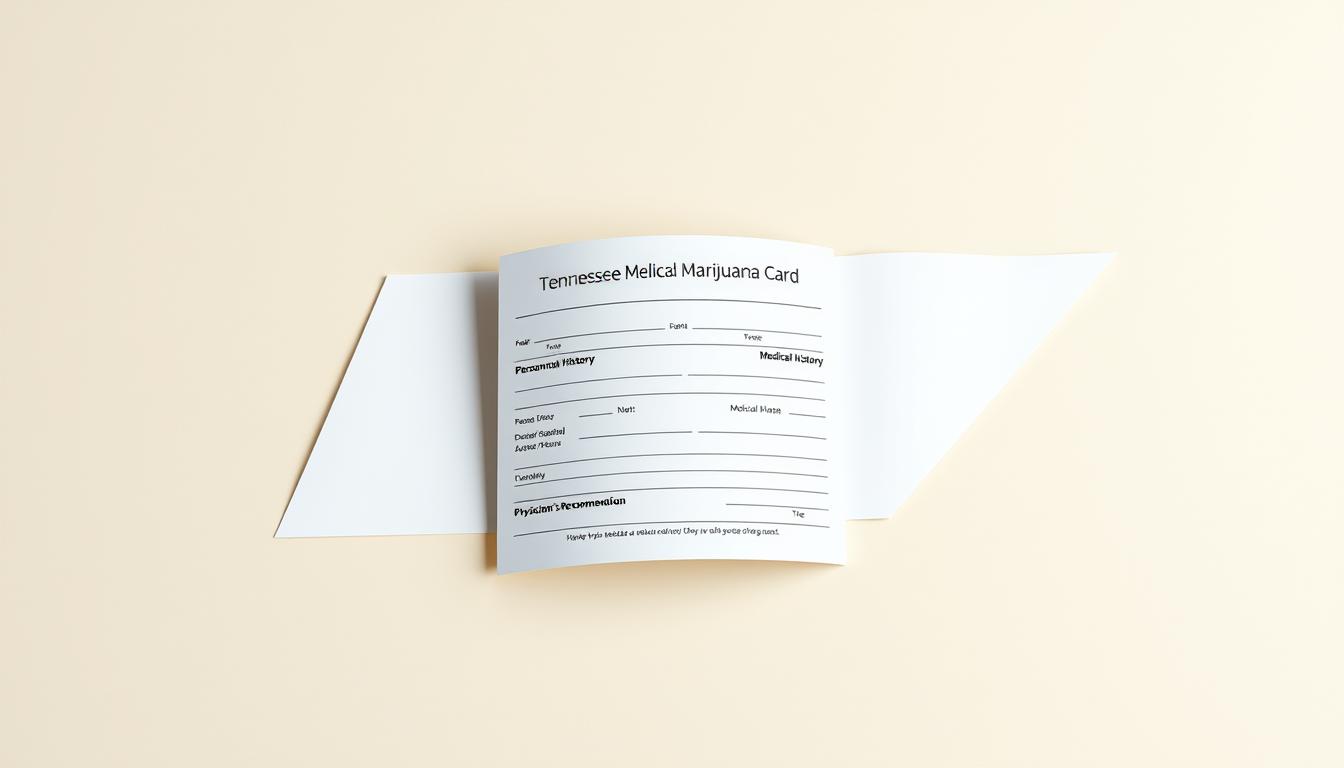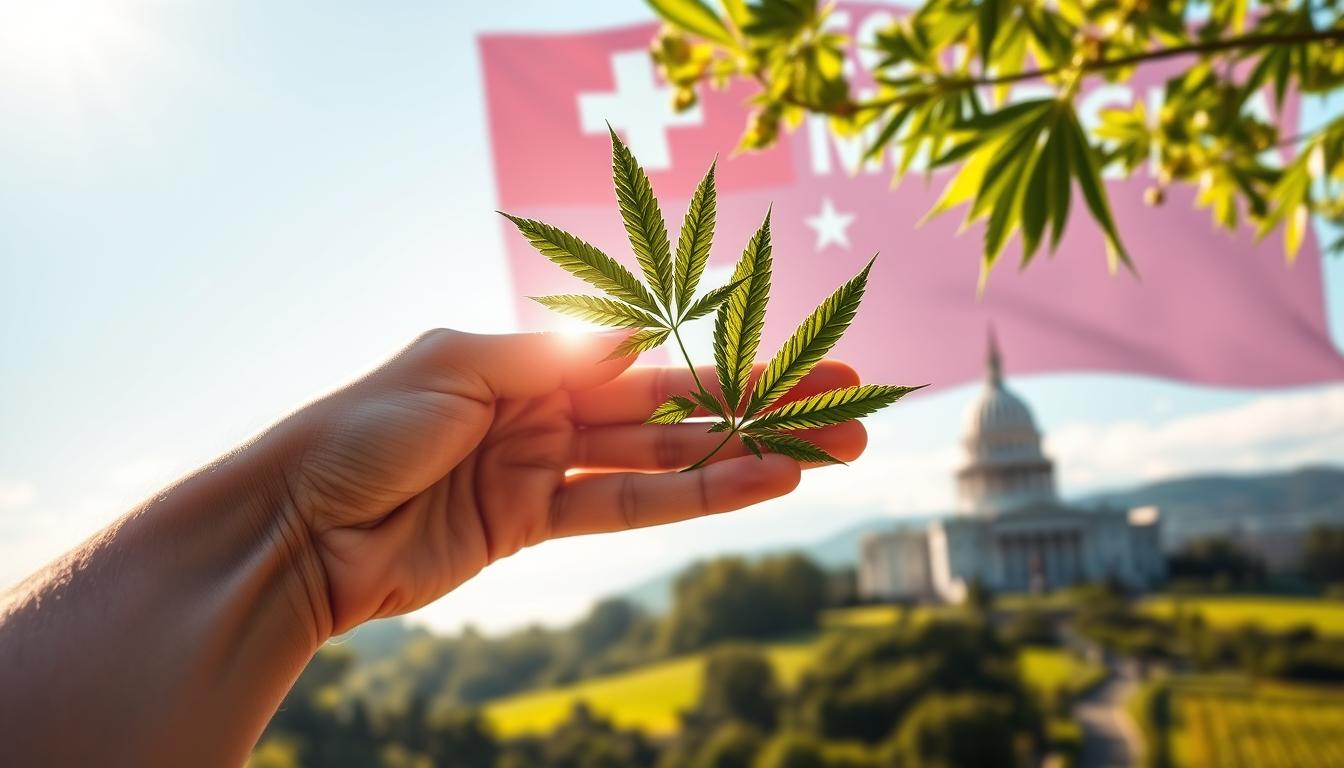What qualifies for medical marijuana in MN?. In 2015, Minnesota became the 22nd state to start a medical cannabis program. It first allowed patients with eight specific conditions, like cancer and seizures, to use it.
As more people asked to add conditions, the list has grown. This has expanded medical cannabis eligibility criteria in the state.
Now, knowing Minnesota medical marijuana requirements is key for those looking for alternative treatments.
The program has evolved, showing more people see the benefits of medical marijuana. It’s important to keep up with the latest status and who can use it.
Understanding Minnesota’s Medical Marijuana Program
It’s key to grasp the details of Minnesota’s medical marijuana program for those seeking relief. The program offers a clear path for using medical cannabis. It ensures patients get this treatment while following the rules.
Overview of the Program
The Minnesota Department of Health runs a registry program. It tracks patient data, treatment options, and outcomes. This helps improve the program for better patient care.
The program is overseen by the Minnesota Department of Health. They manage the registry of patients, providers, and facilities. This ensures safe distribution and patient protection.
Key Definitions and Terms
Knowing key terms is vital for program navigation. A qualifying condition is a medical issue eligible for marijuana treatment. You can find a full list on the Minnesota medical marijuana conditions page.
Other terms to know are healthcare provider and distribution facility. A healthcare provider is a licensed professional who can certify patients. A distribution facility is where patients get their medical marijuana.
Eligibility Requirements for Medical Marijuana
To get into Minnesota’s medical marijuana program, patients must meet certain eligibility criteria. These rules help make sure medical marijuana goes to those who really need it. They also keep the program safe and regulated.
Age Requirements
In Minnesota, you must be at least 18 to apply for medical marijuana on your own. But, if you’re under 18, a parent or guardian can apply for you. This way, kids with serious conditions can also get help.
Residency Requirements
To qualify, you must live in Minnesota. You’ll need to show proof of residency, like a state ID or driver’s license. This rule helps keep the program honest and effective.
Getting a doctor’s certification is also key. You need a licensed physician to confirm you have a qualifying condition. This ensures medical marijuana is used safely and correctly.
By knowing and following these rules, Minnesota residents can join the medical marijuana program. It’s important for patients to understand the requirements and what documents they need. This makes the application process easier.
Qualifying Medical Conditions in Minnesota
To get medical marijuana in Minnesota, patients need a diagnosis from the state’s list. This list includes many diseases and disorders. Medical marijuana can help with these conditions.
List of Eligible Conditions
Minnesota’s rules for medical cannabis cover a wide range of conditions. Here are some examples:
- Chronic pain: Long-lasting pain from various conditions.
- Cancer: Medical marijuana can help with cancer symptoms.
- Glaucoma: High eye pressure that can cause vision loss.
- HIV/AIDS: It helps with pain and nausea in HIV/AIDS patients.
- Tourette’s syndrome: A disorder with vocal and motor tics.
- ALS (Amyotrophic Lateral Sclerosis): A disease that affects nerve cells.
- Seizures: Medical marijuana can help with epilepsy and other seizure disorders.
- Severe and persistent muscle spasms: Often seen in multiple sclerosis.
- Inflammatory bowel disease: Includes Crohn’s disease and ulcerative colitis.
- Terminal illness: It can improve life quality for those with terminal illnesses.
- Intractable pain: Pain that’s hard to manage with usual treatments.
- PTSD (Post-Traumatic Stress Disorder): A mental health issue after a traumatic event.
- Autism: A disorder affecting communication and behavior.
- Obstructive sleep apnea: Pauses in breathing during sleep.
- Alzheimer’s disease: Affects memory and cognitive function.
Special Considerations for Certain Conditions
Some conditions need extra paperwork or specific criteria. For example, PTSD patients must see a psychiatrist or psychologist. Those with autism need detailed medical records.
Patients should talk to a healthcare provider to see if they qualify. The provider will check the condition and give the needed certification.
The Application Process for Medical Marijuana
Patients in Minnesota wanting medical marijuana must first join the state’s registry. They also need a doctor’s certification. This ensures only those who really need it can get medical marijuana.
Step-by-Step Application Guide
The application process has a few main steps:
- Enroll in the Minnesota Medical Cannabis Registry: Patients must sign up with the state’s program. They need to give personal and medical details.
- Obtain Certification from a Licensed Cannabis Doctor: A doctor must confirm the patient has a qualifying condition.
- Submit the Application: After getting certified, patients can apply to the state. They must include all needed documents.
Documentation Needed
Patients need to provide certain documents:
- Proof of Residency: Proof that the patient lives in Minnesota.
- Medical Records: Records that show the patient’s condition.
- Certification from a Healthcare Provider: A doctor’s signed certification.
By following these steps and providing the right documents, patients can apply for medical marijuana in Minnesota.
Role of Healthcare Providers in the Process
Healthcare providers are key in Minnesota’s medical marijuana process. They help patients get a medical marijuana card.
The Minnesota program needs doctors, nurse practitioners, and physician assistants to be registered. This makes sure only the right professionals can certify patients.
Recommended Healthcare Providers
Not all healthcare providers can certify patients for medical marijuana. They must be registered with the state program to do so.
- Doctors (MD/DO)
- Nurse Practitioners (NP)
- Physician Assistants (PA)
These professionals need to be licensed in Minnesota. They also must follow the state’s medical marijuana laws.
Patient-Provider Relationship
The bond between a patient and their healthcare provider is crucial. Providers must check if medical marijuana is right for the patient.
A valid patient-provider relationship is needed. This means the provider must have seen the patient recently before certifying them.
This ensures patients get the right care. It also helps providers make good decisions about medical marijuana for patients.
Knowing the role of healthcare providers helps patients in Minnesota’s medical marijuana program. It ensures they get the care they need.
Obtaining a Medical Marijuana Card
To get medical marijuana in Minnesota, patients must go through an approval process. This process is with the Office of Medical Cannabis. Even though Minnesota doesn’t issue traditional cards, this approval lets patients buy medical marijuana from approved dispensaries.
Application Process
The first step is getting a healthcare provider to say you have a qualifying medical condition. Then, you apply to the Office of Medical Cannabis with the doctor’s note and other needed documents. Make sure all your info is right and complete to avoid delays.
The Office of Medical Cannabis checks your application and the info you give. After they approve it, you get added to the state’s patient registry.
Associated Costs
Getting approval for medical marijuana in Minnesota comes with costs. The first application fee is $50, but it’s free for some with financial issues or on certain programs. Also, you’ll pay for your medical marijuana when you buy it.
It’s key to know the Minnesota medical cannabis guidelines to go through the application smoothly. Patients need to understand the costs and what’s needed to make good choices for their health.
If you’re looking for a medical marijuana card in MN, talk to your doctor to get the needed certification. Also, learn about the Minnesota medical cannabis guidelines to make the application process easier.
To find out more about getting medical marijuana in Minnesota, talk to your doctor or the Office of Medical Cannabis. They can help with the application steps and what you’ll need to pay.
Safe Access to Medical Marijuana
Patients in Minnesota can get medical marijuana safely. They can visit licensed dispensaries or use delivery services. The state’s program makes it easy and secure for patients to get their medicine.
Locations for Obtaining Medical Marijuana
Minnesota has many licensed dispensaries for patients. These places have staff ready to help patients choose the right products. With dispensaries all over the state, patients can easily find where to get medical marijuana.
“The availability of licensed dispensaries across Minnesota has significantly improved patient access to medical marijuana, ensuring that those in need can obtain their medication safely and efficiently.”
Delivery Services and Options
Minnesota dispensaries also offer delivery services. This is great for patients who can’t easily go to a dispensary. They can order online and have their marijuana delivered.
As a patient advocacy group points out,
“Delivery services for medical marijuana are a key part of making sure all patients can get the medicine they need, no matter where they live or how they move.”
Legal Protections for Medical Marijuana Users
The state of Minnesota has set up legal safeguards for medical marijuana patients. This ensures they are protected under the law.
These safeguards are key for those who use medical marijuana for health reasons. They allow patients to get this treatment without fear of unfair consequences.
Employment Protections
Minnesota law stops employers from discriminating against employees or job applicants because they use medical marijuana.
Key protections include:
- Employers can’t fire or refuse to hire someone just because they use medical marijuana.
- Employers can’t discriminate in the workplace because of a positive marijuana test. But, this only applies if the patient used, had, or was under the influence at work.
Yet, employers can enforce rules against being under the influence at work or using marijuana during work hours.
Housing Considerations
Medical marijuana users in Minnesota also have protections under the state’s housing laws.
Landlords are not allowed to:
- Refuse to rent to someone just because they use medical marijuana.
- Evict a tenant or end a lease because of their medical marijuana use.
These protections ensure medical marijuana patients have fair access to housing.
It’s important for medical marijuana patients to know these legal protections. This helps them understand their rights and responsibilities under Minnesota law.
Renewal of Medical Marijuana Cards
Minnesota’s medical marijuana program needs patients to renew their cards every year. This involves several important steps. Knowing how to renew is key to keep getting medical marijuana.
Timeline for Renewal
Patients must renew their medical marijuana card every year. Start the renewal process before your current card expires to keep treatment going. The exact renewal time may change based on Minnesota health department rules.
Information Required for Renewal
To renew, patients need to give updated info, including:
- Current medical records showing the qualifying condition is ongoing
- Any changes in contact info or healthcare provider
- Payment for the renewal fee
Check with the Minnesota health department or a registered healthcare provider for the latest needs and any extra documents.
For patients in Minnesota, knowing the qualifications for medical marijuana card in MN and how to renew is important. Following Minnesota medical cannabis guidelines helps the renewal go smoothly.
By following the renewal steps and staying up-to-date on how to get medical marijuana in Minnesota, patients can keep using medical marijuana for health benefits.
Changes in Minnesota’s Medical Marijuana Legislation
Minnesota’s medical marijuana laws have recently changed, making it easier for patients to get help. The state’s program has been updated, affecting both patients and healthcare providers.
Recent Developments
Minnesota has added more conditions to its list for medical marijuana. This means more patients can now use cannabis treatments. A recent legislative update lets doctors recommend it for more conditions.
“The expansion of qualifying conditions has been a game-changer for many patients in Minnesota,” said a healthcare provider. They see the positive effects of these changes.
Proposed Changes and Their Implications
New changes are coming to Minnesota’s medical marijuana laws. They include adding more conditions and making the application process easier. These updates aim to help more patients and make things simpler.
- Potential addition of new qualifying conditions
- Simplification of the application process
- Enhanced patient protections under state law
As a state legislator noted,
“The proposed changes are designed to make medical marijuana more accessible while ensuring patient safety.”
These changes could help more patients use medical marijuana. They also aim to make it easier to get access.
Patient Rights and Responsibilities
In Minnesota, medical marijuana patients need to know their rights and duties. Knowing these helps you use the program well and enjoy its benefits.
Understanding Patient Rights
Minnesota’s medical marijuana patients can get medical cannabis from approved dispensaries. They also have the right to privacy and confidentiality about their health info. Patients can talk to doctors about treatment options and learn about the pros and cons of medical marijuana.
Patients also have the right to help decide their treatment. This means picking the best medical cannabis products for them. Knowing these rights helps patients take charge of their health.
Responsibilities of Medical Marijuana Patients
Medical marijuana patients in Minnesota have responsibilities too. They must follow the state’s laws and rules. This includes getting a valid registration card and following state guidelines.
Patients should use medical cannabis wisely. This means using it only for medical reasons and not sharing it. They also need to update their registration info and renew it when needed.
By knowing and following these rights and duties, Minnesota’s medical marijuana patients can have a safe and effective experience. It’s important for patients to stay updated on any law changes to stay compliant and get the most from their treatment.
Resources for Medical Marijuana Patients
Patients in Minnesota using medical marijuana have many support groups and information sources. These help them understand medical marijuana use better. They also keep patients updated on the latest rules and who can use it.
Support Groups and Resources
The Minnesota Department of Health is key in supporting medical marijuana patients. They guide on Minnesota medical cannabis guidelines and the medical cannabis eligibility criteria. Many organizations and advocacy groups also offer support. They let patients share experiences and learn from others.
Support groups are great for those new to medical marijuana. They offer advice on managing treatment and using medical marijuana. These groups talk about new research, legal changes, and tips for using it well.
Additional Information Sources
There are many more resources for medical marijuana patients in Minnesota. The Minnesota Department of Health’s website is a top resource. It has lots of info on the medical marijuana program, like how to apply and what conditions qualify.
Patients can find educational materials and FAQs on many topics. These are easy to understand, helping patients make good treatment choices. Doctors who specialize in medical marijuana can also give personalized advice. They help patients use medical marijuana safely and follow Minnesota’s rules.
By using these resources, patients can make sure they’re using medical marijuana safely and as directed by Minnesota’s laws.
Getting Help with the Medical Marijuana Process
Minnesota’s medical marijuana program can seem tough to get through. But, there are many resources to help patients. Knowing the Minnesota medical marijuana requirements is key for a smooth application.
Assistance Organizations
The Minnesota Division of Medical Cannabis offers help. They guide on medical cannabis eligibility and getting a medical marijuana card in MN. These resources explain what documents you need and the steps to get a card.
Common Questions and Answers
Patients often wonder about the application, how much they can have, and work rights. The Minnesota Division of Medical Cannabis and other trusted sources answer these questions. This helps patients make smart choices about using medical marijuana.
Using these resources, patients can make sure they qualify for a medical marijuana card in MN. They can also move through the program with confidence.


